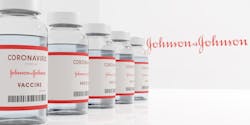The COVID-19 outbreak is still pushing manufacturers to cooperate. Merck & Co. announced March 2 that it would collaborate with competing pharmaceutical company Johnson & Johnson to produce and bottle J&J’s COVID vaccine, which received an emergency use authorization from the FDA in the last week of February.
BARDA, the Biomedical Advanced Research and Development Authority, part of the Department of Health and Human Services, helped push the agreement forward.
As part of the agreement, Merck will use two of its existing factories to produce and fill vials of Johnson & Johnson’s formula. Merck will receive up to $268.8 million to adapt its facilities for the purpose from the federal government.
“This funding from BARDA will allow us to accelerate our efforts to scale up our manufacturing capacity to enable timely delivery of much needed medicines and vaccines for the pandemic,” said Mike Nally, executive VP of Human Health at Merck. In a statement, Nally said Merck is committed to contributing to the anti-COVID effort.
Remo Colarusso, VP of Janssen Supply Chain LLC at Johnson & Johnson, said the agreement was “a testament to the inspiring teamwork exemplified at our company.”
Johnson & Johnson is currently running behind its expected production targets: Although the company signed a $1 billion contract with Operation Warp Speed to deliver doses rapidly, including 37 million doses by the end of March, a J&J executive told a congressional subcommittee that only 20 million would be ready by then.
Although the deal could dramatically increase the amounts of vaccine produced overall, it’s unclear if Merck will be able to retrofit its factories in time to source vaccines for the urgent demand Johnson & Johnson currently faces for them. The company is still on the hook with the government to produce 100 million doses of its vaccine by the end of June.
In remarks at the White House, President Biden said the agreement was “a major step forward,” and said he would use the Defense Production Act to equip Merck appropriately for the move. “This is the type of collaboration between companies we saw in World War Two,” he said.
Johnson & Johnson and Merck have been in talks to collaborate on vaccine production since the Trump Administration. Press Secretary Psaki, in remarks to the press March 2, credited the Biden Administration with getting the deal “across the finish line,” but acknowledged that Merck and J&J had discussed the deal before Johnson & Johnson’s vaccine was approved by the FDA and before Biden took office.
About the Author
Ryan Secard
Associate Editor
Ryan Secard joined Endeavor B2B in 2020 as a news editor for IndustryWeek. He currently contributes to IW, American Machinist, Foundry Management & Technology, and Plant Services on breaking manufacturing news, new products, plant openings and closures, and labor issues in manufacturing.
